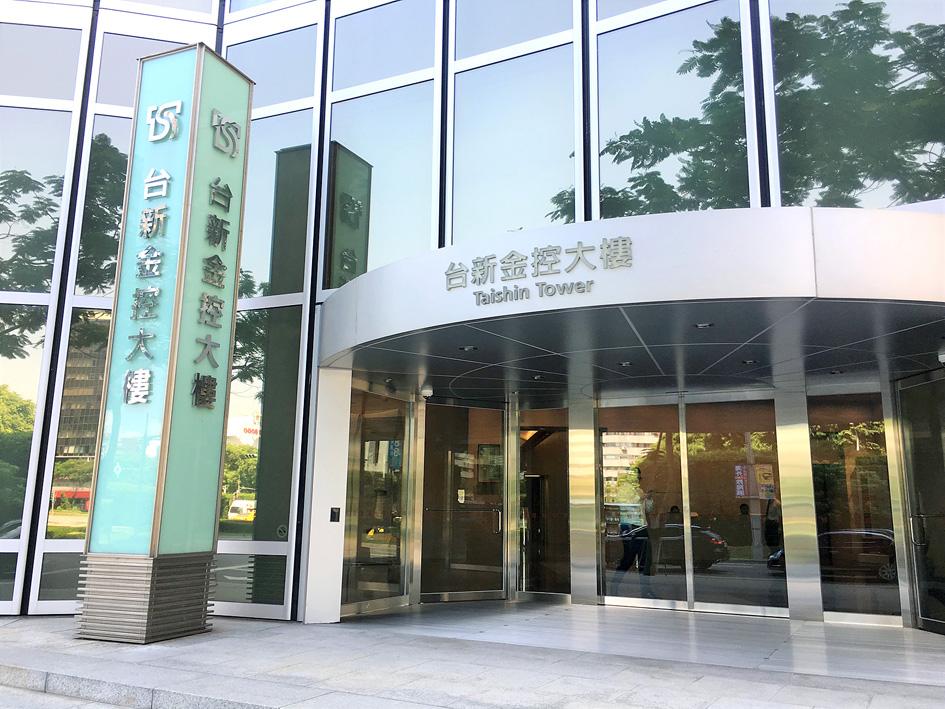Taishin Financial Holding Co (台新金控) yesterday said its banking unit is expected to see high single-digit percentage growth in corporate lending this year, despite the COVID-19 outbreak.
Taishin International Bank (台新銀行) reported a 23.5 percent increase in corporate loans to NT$552 billion (US$18.46 billion) in the first quarter, from NT$447 billion a year earlier, the parent company told an investors’ conference in Taipei.
The loan book grew significantly in March as many big companies applied to increase borrowings to prepare for the fallout of the pandemic and to maintain their business operations, Taishin Financial head of wholesale banking Sharon Lin (林淑真) said, adding that most of them are short-term loans.

Photo: Kelson Wang, Taipei Times
Lending to manufacturers accounted for 37.7 percent of its total corporate loans, followed by 20 percent for financial companies, 14.2 percent for property and construction firms, 10.6 percent for the retail and wholesale sector, and 6 percent for transportation and telecom firms, she said.
“With unclear visibility on corporate lending ahead, we would be more cautious, but still keep our original goal of high single-digit growth in corporate lending this year,” Taishin Financial president Welch Lin (林維俊) said.
The bank’s nonperforming loan ratio grew to 0.2 percent, up from 0.17 percent at the end of last year, as it recognized soured loans to a unit of China Energy Reserve and Chemicals Group Co (中國國儲能源) in Shanghai, it said.
As loans extended to industries vulnerable to the outbreak, such as tourism, hotels and aviation, made up less than 1 percent of its corporate lending, loan quality should remain sound this year, Sharon Lin said.
The bank is not worried about exposure to companies in the petrochemical industry, despite volatile crude oil prices, as the financial strength of state-run oil refiner CPC Corp, Taiwan (台灣中油) — its sole debtor domestically — remains solid, she said.
Despite the loan growth in the first quarter, net fee income from corporate banking fell 24.8 percent annually to NT$314 million, as many syndicated loans had been postponed due to the outbreak, the bank said.
Net interest margin (NIM), a gauge of banks’ profitability, remained flat from a quarter earlier at 1.21 percent, while it expects NIM to decline by 10.7 basis points by the end of this year due to the rates cuts by the US Federal Reserve and the central bank in March.
Regarding overseas expansion, the bank last month received approval from the China Banking and Insurance Regulatory Commission to set up an office in Shanghai, which would begin operations later this quarter.
It is still awaiting approval from national regulators to set up new branches in Long An, Vietnam, and Labuan, Malaysia, Welch Lin said.
He did not comment on reports that Taishin Financial plans to acquire Prudential Life Insurance Inc’s local unit, saying only that the company’s goal to have banking, insurance and securities units for better business development.
In other news, SinoPac Financial Holdings Co’s (永豐金控) appointment of former Chung-Hua Institution for Economic Research (中華經濟研究院) president Chen Shi-kuan (陳思寬) as chairperson was approved during its annual shareholders’ meeting in Taipei.
Chen not only is SinoPac’s first chairwoman, she is the first among the nation’s seven privately owned financial holding companies.

When an apartment comes up for rent in Germany’s big cities, hundreds of prospective tenants often queue down the street to view it, but the acute shortage of affordable housing is getting scant attention ahead of today’s snap general election. “Housing is one of the main problems for people, but nobody talks about it, nobody takes it seriously,” said Andreas Ibel, president of Build Europe, an association representing housing developers. Migration and the sluggish economy top the list of voters’ concerns, but analysts say housing policy fails to break through as returns on investment take time to register, making the

‘SILVER LINING’: Although the news caused TSMC to fall on the local market, an analyst said that as tariffs are not set to go into effect until April, there is still time for negotiations US President Donald Trump on Tuesday said that he would likely impose tariffs on semiconductor, automobile and pharmaceutical imports of about 25 percent, with an announcement coming as soon as April 2 in a move that would represent a dramatic widening of the US leader’s trade war. “I probably will tell you that on April 2, but it’ll be in the neighborhood of 25 percent,” Trump told reporters at his Mar-a-Lago club when asked about his plan for auto tariffs. Asked about similar levies on pharmaceutical drugs and semiconductors, the president said that “it’ll be 25 percent and higher, and it’ll

CHIP BOOM: Revenue for the semiconductor industry is set to reach US$1 trillion by 2032, opening up opportunities for the chip pacakging and testing company, it said ASE Technology Holding Co (日月光投控), the world’s largest provider of outsourced semiconductor assembly and test (OSAT) services, yesterday launched a new advanced manufacturing facility in Penang, Malaysia, aiming to meet growing demand for emerging technologies such as generative artificial intelligence (AI) applications. The US$300 million facility is a critical step in expanding ASE’s global footprint, offering an alternative for customers from the US, Europe, Japan, South Korea and China to assemble and test chips outside of Taiwan amid efforts to diversify supply chains. The plant, the company’s fifth in Malaysia, is part of a strategic expansion plan that would more than triple

Taiwanese artificial intelligence (AI) server makers are expected to make major investments in Texas in May after US President Donald Trump’s first 100 days in office and amid his rising tariff threats, Taiwan Electrical and Electronic Manufacturers’ Association (TEEMA, 台灣電子電機公會) chairman Richard Lee (李詩欽) said yesterday. The association led a delegation of seven AI server manufacturers to Washington, as well as the US states of California, Texas and New Mexico, to discuss land and tax issues, as Taiwanese firms speed up their production plans in the US with many of them seeing Texas as their top option for investment, Lee said. The